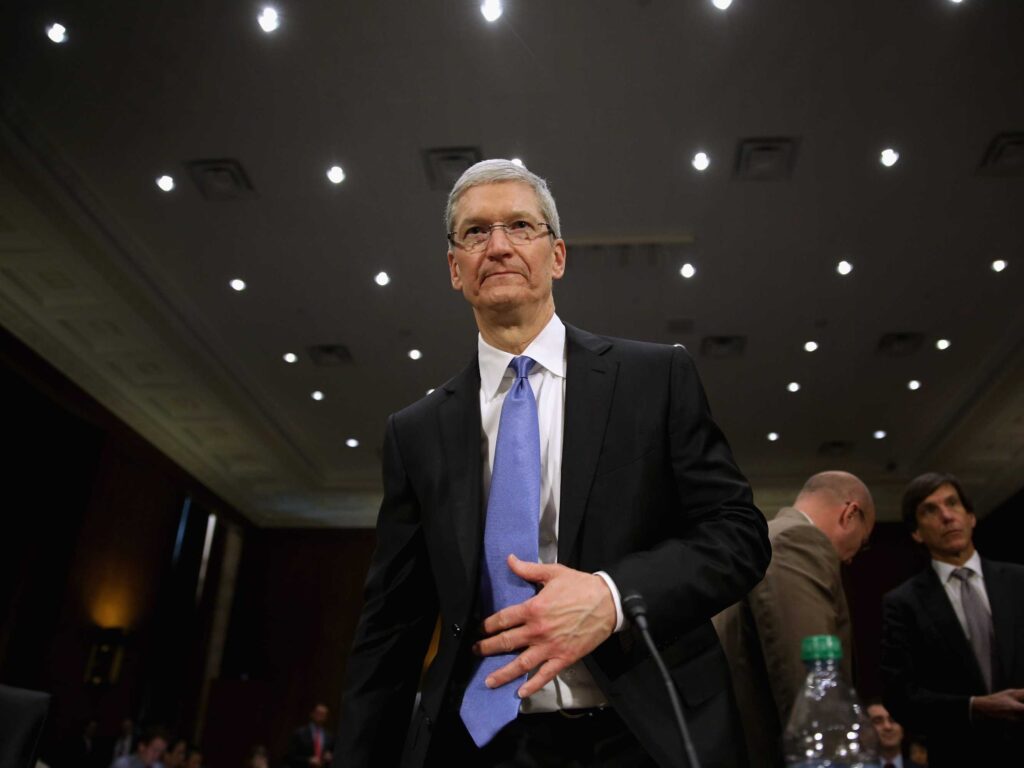- Apple is now the only major tech giant that hasn't conducted mass layoffs recently.
- Apple is in a different position than its peers because it has been more strategic about its growth.
- Wall Street hopes that CEO Tim Cook's pragmatic approach puts Apple in a better spot.
With Google's parent company Alphabet announcing layoffs Friday morning, Apple is now the only major tech giant that hasn't conducted mass layoffs in recent months as a souring economy looms over Silicon Valley.
The combination of rising interest rates and ongoing inflation have led to cooling customer demand and shrinking advertising budgets lead Amazon, Microsoft, and now Google to dramatically cut headcount in recent months. The tech giants hired like mad during the early pandemic years, but are now looking to rein in their spending.
Apple is in a different, stronger position, though, industry analysts tell Insider — a position that they say validates CEO Tim Cook's pragmatic approach to growth. The iPhone giant's more slow-paced, measured growth over the last several years have put it in a better spot to weather a downturn or recession without having to do mass layoffs.
"I believe Apple is still in significant growth mode," Wedbush Securities analyst Dan Ives told Insider. "In other words, I wouldn't expect the 7 to 10% layoffs. I think it's more cutting around the edges and being more prudent rather than ripping the band-aid off."
Between September 2021 and September 2022 the company only hired 10,000 new employees, growing headcount from 154,000 to 164,000 full time employees, according to filings with the SEC. That's well below the tens of thousands that Amazon, Meta, and Google each hired over the same period.
"He's the most pragmatic of the tech CEOs. I think he's the most risk adverse, and I think that plays into how they've been doing their hiring," said analyst Gene Munster of Loup Ventures.
Additionally, Apple's business model is very different from many of the other tech giants. Its primary business is in selling phones, tablets, and computers, not in advertising, making it less subject to the whims of the advertising industry. And while Apple does own and operate several retail stores around the world, the company's physical footprint is relatively small when compared to Amazon's massive network of warehouses and logistics hubs.
Additionally, manufacturing of its products is outsourced to third parties, which means it doesn't feel the impacts of changes in the smartphone demand cycle immediately, said Patrick Moorhead, principal analyst at Moor Insights & Strategy.
"They don't have their own factories," Moorhead said. "So the ebbs and flows of the number of iPhones and the number of devices, from a people standpoint, you're not gonna see that."
Lastly, another hallmark of Cook's strategy is that Apple doesn't have a history of pouring money into risky, whimsical side projects. Google has its famed "moonshot factory," Amazon and Microsoft both have their own cutting-edge research teams, and Meta has its big metaverse dreams. Apple, however, tends not to spend a lot of time or money on projects that aren't core to the business.
"He's a visionary and very careful in terms of build-out of businesses," Wedbush Securities analyst Dan Ives said of Apple CEO Cook.
That's not to say Apple will be totally unaffected by the downturn. The company will likely have to make more small job cuts, as its already reported to have started doing. It will likely look to cut in areas that aren't growing quickly or that don't reflect Cook's main priorities, Ives said.
Ives speculates that those cuts could come to the Mac computer business, amid slowing growth in the overall PC sector. He also says that the Siri voice assistant and its larger speech technology organization might be a target for cost-cutting, as would be its nascent healthcare initiatives.
Got a tip about Apple? Contact this reporter via email at [email protected] or Signal at 925-364-4258. (PR pitches by email only, please.)
